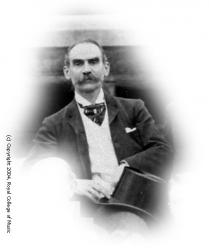Planning worship?
Check out our sister site, ZeteoSearch.org,
for 20+ additional resources related to your search.
- |
User Links
Person Results
F. A. Gore Ouseley

1825 - 1889 Person Name: F. A. G. Ouseley, 1825-1889 Composer of "EASTHAM" in Hymnal and Liturgies of the Moravian Church Born: August 12, 1825, London, England.
Died: April 6, 1889, Hereford, England.
Buried: Church of St. Michael and All Angels, Tenbury Wells, Hereford and Worcester, England.
Gore-Ouseley was educated at Oxford University (BA 1846, MA 1849, DMus 1854), and was ordained in 1849. In 1855, he was appointed Oxford Professor of Music, succeeding Henry Bishop. At that time, Oxford music degrees were easy to obtain, as there were no conditions of residence. Candidates only had to submit a musical composition, (e.g., for choir or orchestra). This was then approved by the examiner, rehearsed and performed to a small, select audience at Oxford. As far as Ouseley was concerned, this only meant two or three trips to Oxford each year, usually for two or three days each time, as there was no music "taught" in the university and very little in Oxford itself at the time.
Also in 1855, Ouseley was appointed Precentor of Hereford Cathedral, a post he held for the next 30 years, before becoming a Canon there. Although theoretically in charge of the cathedral choir, Ouseley only had to be in residence at the cathedral two months each year, and he arranged these to take place during the summer vacation, when he was not required to be at his College, although such was his commitment that he did make regular visits to the cathedral, which was only 18 miles from his College at St. Michael’s.
His College of St. Michael’s, Tenbury, a "model" choir school, opened in 1856, mostly at his own expense. He founded the College and was its first Warden, which was the greater part of his work for the next 33 years.
Ouseley’s compositions covered a wide range: operas, songs, chamber music and organ pieces. His works include the following treatises:
Harmony (London: 1868)
Counterpoint (London: 1869)
Canon and Fugue (London: 1869)
Form and General Composition (London: 1875)
--www.hymntime.com/tch/
F. A. Gore Ouseley
Alfred J. Caldicott

1842 - 1897 Person Name: A. J. Caldicott, Mus. Doc. Composer of "CIVITAS DEI" in The Congregational Mission Hymnal The eldest son of a hop merchant and amateur musician at Worcester, the Alfred James Caldicott was born there on November 26, 1842. Like his six brothers, he was a chorister in the Cathedral choir, and at the age of fourteen was articled to the late Mr. Done, the Cathedral organist. He subsequently entered the Conservatorium at Leipzig, where he studied under Moscheles, Hauptmann, and Plaidy. On his return to Worcester he became organist of St. Stephen's Church and to the Corporation, and also conductor of the Worcester Musical Society. In 1878 he took the degree of Bachelor in Music at the University of Cambridge, under the Professorate of Sir G.A.Macfarren. Three years later his sacred cantata "The Widow of Nain" was performed at the Worcester Musical Festival. After a short residence at Torquay in 1882, Mr. Caldicott settled in London in the following year, and was appointed a professor of harmony at the Royal College of Music.
In 1885 he became musical director of the now defunct Albert Palace at Battersea. He toured with an opera company in America, 1890–91 and was conductor at the Comedy and other theatres. Mr Caldicott is, however, best known as a composer of vocal music cast in a light vein, in which he was highly successful. For the German Reed entertainments he composed "Treasure Trove" (1883) and other operettas, thirteen in all. "John Smith" and "The Girton Girl and the Milkmaid", composed for London theatres, were of a similar nature. Two cantatas for female voices – "A Rhine Legend" and "Queen of May" – must also be mentioned. Mr. Caldicott's humorous part-songs, of which "Humpty Dumpty" (special prize, Manchester Gentlemen's Glee Society, 1878) is a highly characteristic specimen, gave the lamented composer widespread popularity.
--www.cph.rcm.ac.uk/
Alfred J. Caldicott
Johann Friedrich Reichardt
1752 - 1814 Person Name: Reichardt Composer of "[Ten thousand times ten thousand]" in Gathered Jewels No. 2
Johann Friedrich Reichardt
P. R. Richards
Composer of "[Ten thousand times ten thousand]" in The Spirit of Praise
P. R. Richards
W. F. Sudds
1843 - 1920 Composer of "[Ten thousand times ten thousand]" in The Y.M.C.A. Praise Book
W. F. Sudds
J. Montgomerie Bell
1837 - 1910 Composer of "ST. CATHARINE" in The Presbyterian Book of Praise John Montgomerie Bell was a hymnwriter and botanist born on May 28, 1837. He died on June 8, 1910 in Edinburgh, Scotland.
NN, Hymnary. Source: http://composers-classical-music.com/b/BellJohnMontgomerie.htmv
J. Montgomerie Bell


 My Starred Hymns
My Starred Hymns


